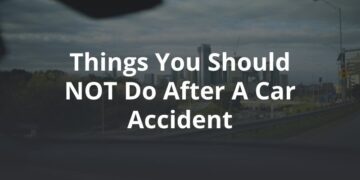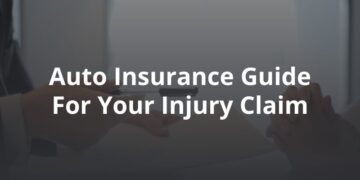More than 400,000 accidents involving large trucks occur each year, and about 10 percent of them are fatal. While it may be easy to blame the driver of a cumbersome 18-wheeler for not paying attention on the road, a large percentage of these accidents are actually caused by the driver of a passenger vehicle.
Drivers of passenger cars often assume they have more time and road than they actually do. Driving too fast, cutting off trucks, and not giving trucks enough distance to stop are common reasons for accidents between commercial trucks and cars. And when it comes to a collision between a 40-ton truck and a two-ton car, there’s a high probability that the car and its driver will experience more damage.
Beyond the regular rules of the road — like driving the speed limit, using turn signals, and not texting while driving — there are many things you can do to avoid an accident with an 18-wheeler.
Avoid Blind Spots
Trucks have blind spots in the front, in the rear, and on the sides, so it can be tricky to avoid them. But if your car is in any of these blind spots, the truck driver may not see you, putting you in danger when the driver turns or changes lanes. In fact, if you can’t see the truck driver’s face in the side mirror, that means they aren’t able to see you.
The best way to avoid an 18-wheeler’s blind spots is to give yourself plenty of room when driving near the truck. About 30 feet is a good rule of thumb to be sure you’re at an acceptable distance. Many trucks even have stickers on them indicating that you’re in a blind spot in case you’re not sure.
If you need to pass a truck, do so quickly so you’re not in a blind spot for long. Try to always pass on the left of the truck — this blind spot is slightly smaller than the one on the right. Just remember not to speed as you pass.
Give Trucks Room to Turn
If you’ve ever watched an 18-wheeler make a turn, you know how much room it needs. It often takes up an entire intersection, and the cab and trailer may take slightly different paths.
Because of the wide berth trucks need to turn, it’s important that you hang back when you see a truck with its turn signal on. Never try to pass a truck that is planning to turn, and don’t try to wedge yourself between the truck and the curb. If you’re nearing an intersection, be sure to stop behind the line so you give the truck sufficient space to get through without hitting your car.
Increase Your Following Distance
It’s never a good idea to tailgate a truck. If a truck driver needs to stop abruptly to avoid an accident or handle a tire blowout, that can mean major damage to your vehicle. And if you’re tailgating a truck, that also means you’re in the driver’s blind spot and they may not even know you’re there.
Try to maintain a time distance of at least four seconds between your car and an 18-wheeler — more if you’re driving in inclement weather. This will give you more time to react if the truck needs to stop.
Don’t Cut Off a Truck
While it’s often tempting to speed past a slow-moving truck to get around it, you should never cut off an 18-wheeler. Because of their weight, trucks take much longer to stop. In good driving conditions, it can take a truck more than the length of two football fields to come to a complete stop. If you cut off a truck and it needs to stop abruptly, there’s a good chance you’ll get hit — and severely damaged.
If you do need to get around a truck, always use your turn signal and make sure not to cut too closely in front of it. Give yourself plenty of space to make a safe lane change, or move into a lane without a truck if possible. If you do need to merge in front of a truck, try to make sure you can see it in your rearview mirror to ensure that you’re at a good distance ahead.
Give Trucks the Right of Way
Whenever possible, always let a truck go first. It’s generally safer to let an 18-wheeler go in front of you than to try to speed past it. Be sure to give the truck driver plenty of space to safely pass or change lanes.
Pay Attention to the Truck Driver
Most truck drivers are good at communicating with other cars on the road, often using their headlights. After you put on your turn signal, check to see what the truck driver does. When a driver flashes the truck lights once, that typically means you are safe to move in front of them. If the driver flashes the lights multiple times or puts on the high beams, that typically means it’s not safe to merge and you should stay where you are.
Be Patient
This goes without saying any time you’re on the road, but be patient. It may be frustrating to drive behind a slow-moving 18-wheeler, but driving aggressively, honking, and yelling at the driver won’t help. In fact, the distraction of any of those activities may lead to an accident.
Always keep in mind that truck drivers must follow stricter rules than a passenger car driver, including driving at lower speeds. This is for the safety of the driver and everyone else on the road. If you’re getting impatient, wait until it’s safe to move around the truck and then get on your way.
How FVF Can Help
No matter how safe you are on the road, sometimes accidents happen. Accidents involving 18-wheelers can cause especially serious physical and emotional damage. And trying to figure out who actually caused the accident and who is liable for any injuries can get extremely complicated.
At FVF, our 18-wheeler accident lawyers are here to help. We can investigate your accident to determine who was at fault and help you recover the compensation you deserve, including medical bills, lost wages, and pain and suffering.
We aim to give you the tools and knowledge to make informed decisions about your case. We offer free, no-pressure case evaluations so you know what to expect and what type of financial recovery we may be able to get for you. Contact us today to talk to an experienced 18-wheeler accident lawyer who can help.





